Safe and Respectful Sexual Health Care in WA
Did you know that in Western Australia, everyone, including people from diverse backgrounds, can access safe, respectful, and confidential sexual health care?
Whether you’re visiting a doctor (also known as a general practitioner or GP) for a check-up, asking questions about HIV testing, or learning about STI prevention methods like condoms or PrEP, you have the right to be supported without judgement.
Sexual health is part of your health and wellbeing. No matter your age, visa status, language, or whether you’re currently sexually active, it’s always okay to ask questions and seek information.
Why HIV Prevention Matters
Did you know that learning about HIV helps protect you, your partner, and your community.
HIV affects people of all backgrounds, including international students, migrants, and refugees.
Understanding PrEP
Did you know there’s a pill that helps prevent HIV?
PrEP (Pre-Exposure Prophylaxis) is a daily medication for people who don’t have HIV but may be at risk. When taken correctly, PrEP is nearly 100% effective at preventing HIV.
You can ask your doctor:
-
“Can you tell me more about PrEP?”
-
“I heard PrEP can help prevent HIV – is it right for me?”
-
“Is PrEP available here in Western Australia?”
-
“I’d like to know if I can start PrEP.”
PrEP is for everyone, including heterosexual people, and people from diverse backgrounds. If your doctor doesn’t know about it, you can find another doctor who does.
🔗 Learn more about PrEP (WAAC)
🔗 Find a doctor who understands PrEP and HIV (ASHM)
🔗 PrEP information in languages other than English (Stay STI Free)
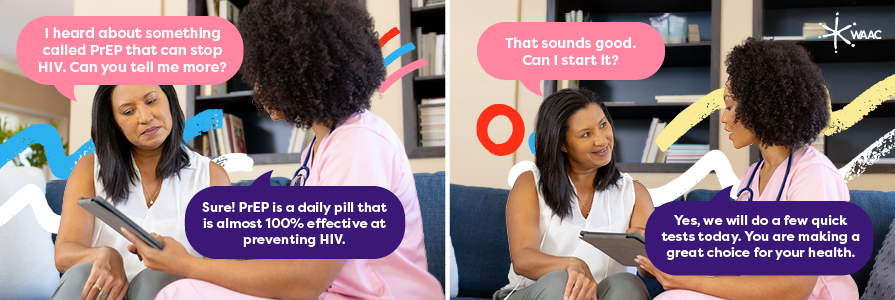
Understanding PEP
PEP (Post-Exposure Prophylaxis) is different – it’s taken after possible exposure to HIV (e.g., if a condom breaks or you had unprotected sex).
PEP must be started within 72 hours, and the sooner the better.
You can get PEP at:
-
Hospital emergency departments
-
Sexual health clinics
-
Some GPs familiar with HIV prevention
🔗 Find PEP near you (Get PEP)
🔗 PeP information in languages other than English
Understanding Condoms
While PrEP and PEP protect against HIV, they don’t stop other sexually transmissible infections (STIs) like syphilis, gonorrhoea and chlamydia.
Condoms are an easy and effective way to protect yourself and your partners, regardless of gender or sexual orientation. They are available at pharmacies, clinics, and even supermarkets.
🔗 Free condoms for Organisations (WAAC)
🔗 Safer sex information
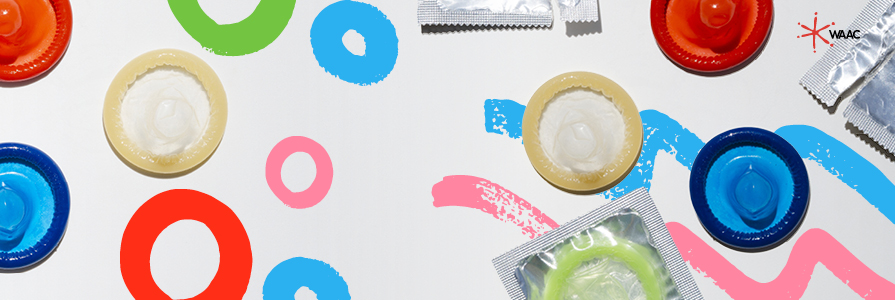
HIV Testing in Western Australia: Easy, Private, and Often Free
Did you know anyone can get tested for HIV in WA?
Whether you are a new migrant, temporary visa holder, or international student, you can access confidential HIV testing, often for free – even if you don’t have Medicare.
HIV testing is quick, easy, and often free at clinics, and your doctor will keep your test and results private.
Getting Tested with Medicare
You can ask your doctor or GP for an HIV test at any time. It is good to get routine HIV tests to know your status, even if you don’t think you are at risk.
Some doctors might not offer an HIV test unless you ask – and that’s okay! Everyone can ask for an HIV test, even you.
Some ways you can ask your doctor include:
-
“Can I get an HIV test today?”
-
“Do you think I should be tested for HIV?”
-
“I’m worried about HIV — can we talk?”
🔗 Getting an HIV test with medicare information in languages other than English
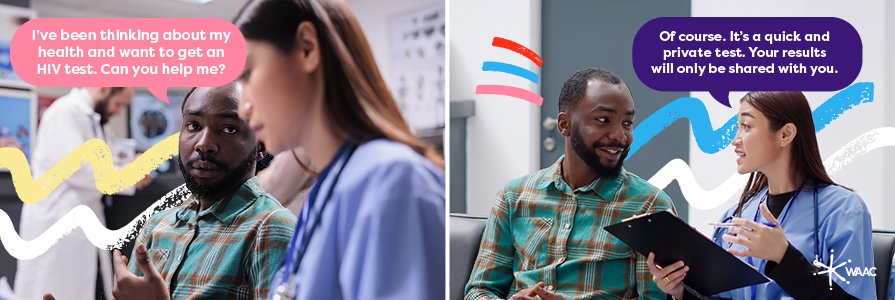
Getting Tested without Medicare
Don’t have Medicare? No problem. There are clinics offering free or low-cost HIV testing in WA, and your usual doctor may also be able to help.
If you are visiting your doctor, make sure to call ahead and let them know you don’t have medicare to make sure there is no cost.
Free clinics can be found below:
🔗 M Clinic (for LGBTIQA+ identifying male and trans people)
🔗 SHQ (for everyone)
🔗 Royal Perth Hospital Sexual Health Clinic (for everyone)
🔗 Getting an HIV test without Medicare information in languages other than English
🔎 Learn more and find a testing clinic
Getting Tested at Home
If you’re nervous about seeing a doctor, you can also test yourself at home using an ATOMO HIV self-test kit.
Testing at home takes only 15 minutes and requires just a small drop of blood.
You can buy ATOMO HIV self-test kits online, at select pharmacies (including Pharmacy 777), or at M Clinic.
Just remember – any positive results should be confirmed with a trip to the doctor, just to be sure.
🔗 Order ATOMO HIV Self Test Kit Online
🔗 HIV testing at home information in languages other than English
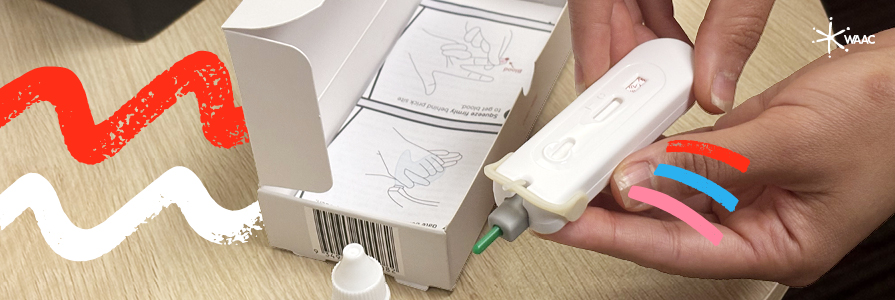
HIV Treatment Is for Everyone in Australia
Did you know that in Australia, HIV treatment is available to everyone, regardless of your visa or background.
If you test positive for HIV, you can still live a full and healthy life.
With the right care, HIV will not become AIDS. AIDS is a late stage of HIV, but most people in Australia who take treatment never get AIDS.
With early treatment, you can:
-
Stay strong and healthy
-
Prevent passing HIV to others
-
Have a safe pregnancy and healthy baby
Understanding U=U
Antiretrovial Medications (ARV) work to reduce the amount oh HIV in the body, also known as your viral load.
Once your viral load is low enough, it becomes what is referred to as undetectable. Someone with an undetectable viral load cannot pass the virus on to others, meaning that they are untransmittable.
This is where the term undetectable = untransmittable, or U=U comes from.
A person living with HIV must continue to take their ARVs as prescribed to keep their viral load undetectable, and to prevent HIV from impacting their health.
You will need to visit your HIV doctor regularly to check your health and manage your treatment. If you don’t have access to Medicare, there are some options available to help reduce the cost of your care and medication.
🔗 Learn more about U=U
🔗 More information in languages other than English
Understanding HIV and Pregnancy
HIV can sometimes pass from a parent to a baby during pregnancy, birth, or breastfeeding, especially if the HIV is left untreated in the parent.
With good medical care, this can almost always be stopped, and a person with HIV can have a safe and healthy baby.
If you are HIV positive and wanting to have a baby, speak to your doctor about your options, and they will provide medical care to ensure a smooth pregnancy where your baby is HIV free.
🔗 Learn more about HIV treatment and support
🔗 HIV treatment when you don’t have Medicare in languages other than English
🔗 HIV and having a baby information in languages other than English
Talking About Sexual Health
Did you know that talking about sexual health is normal in Western Australia – especially with partners and your doctor.
It’s normal to feel nervous when it comes to talking about sexual health, but remember, knowing you and your partners sexual health status helps keep everyone healthy
Talking to your Doctor about Sexual Health
in Australia, doctors are trained to talk about sexual health and HIV testing without judgement. You have the right to choose a doctor who speaks your language or understands your culture.
When talking to your doctor, you can say:
-
“Can I ask you a question about sexual health?”
-
“I want to check if I need an HIV or STI test.”
-
“I heard about PrEP — is that something for me?”
By law, doctors must keep everything confidential, including your visa status, your sexual history, and any test results.
Talking to a Partner about Sexual Health
Talking to a partner about sexual health testing and HIV prevention is a powerful way to protect each other.
Knowing your sexual health status and theirs can help prevent the spread of STIs, and can also help keep yourself and others safe.
When talking about sexual health with a partner, you can ask:
-
“Have you ever been tested for HIV or STIs?”
-
“I want to get tested. Want to do it with me?”
-
“Have you heard about PrEP or PEP?”
-
“Let’s talk about condoms and keeping safe.”
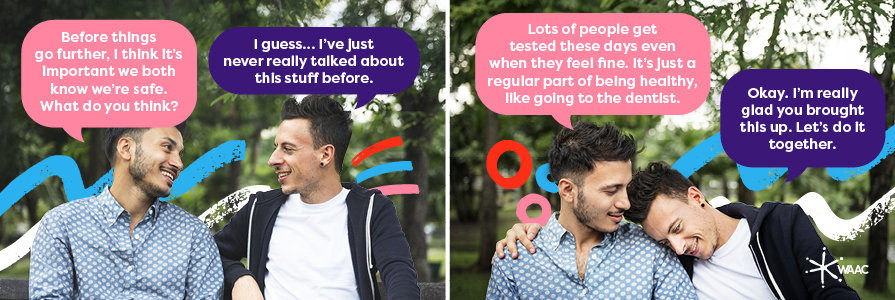
About the Even Me? Campaign
The “Even Me?” campaign was created to improve HIV awareness, testing, and prevention among diverse communities in Western Australia.
HIV is no longer just a concern for gay and bisexual men. Increasingly, it affects people from heterosexual and diverse backgrounds who may not know their risk or how to protect themselves.
WAAC has worked closely with community members, migrant health organisations, and healthcare providers to create resources that:
-
Correct myths about HIV
-
Explain how HIV spreads
-
Encourage testing and treatment
-
Promote prevention options like PrEP, PEP, and condoms
📩 Want to bring this message to your community? Email [email protected] with the subject line “Even Me? Campaign.”
Free Resources
Download and share videos, posters, and flyers. All campaign materials are available for free use.
Need printed posters? Email [email protected].
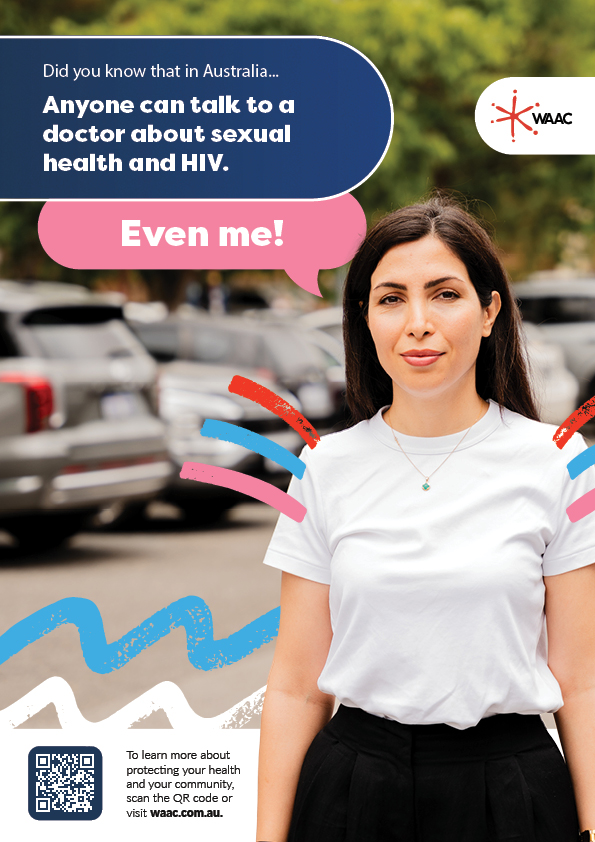 |
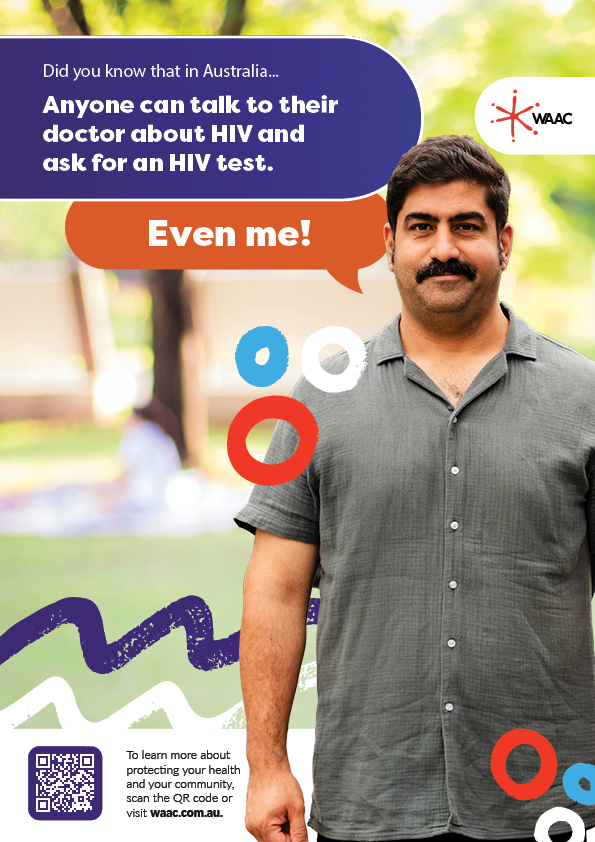 |
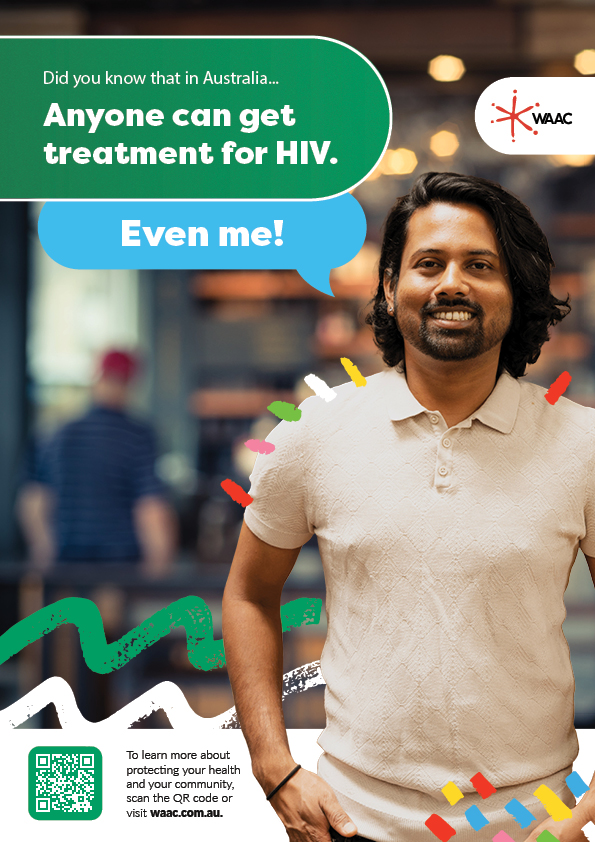 |
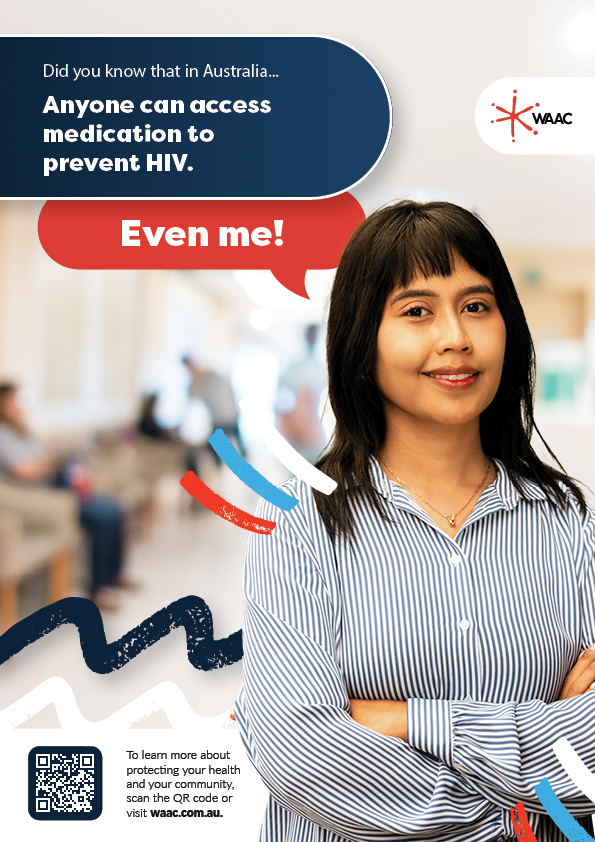 |
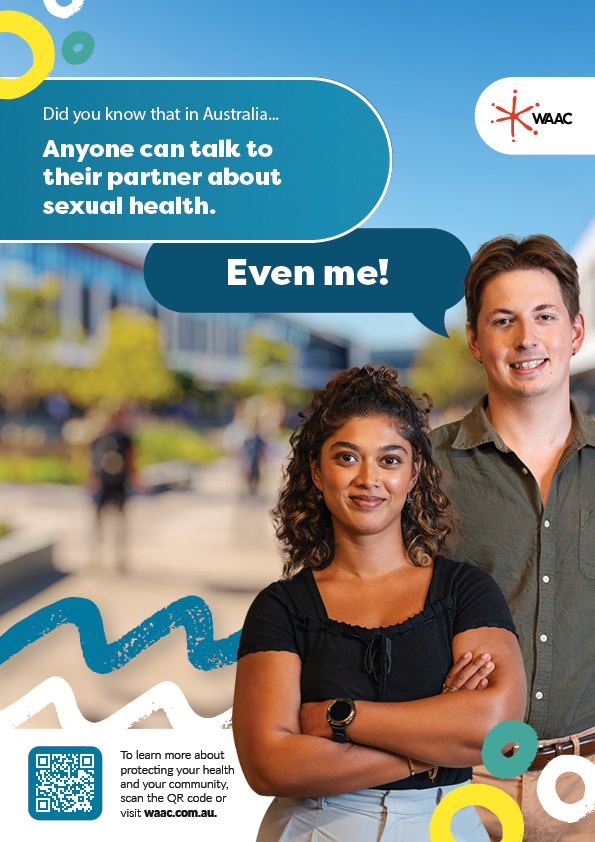 |
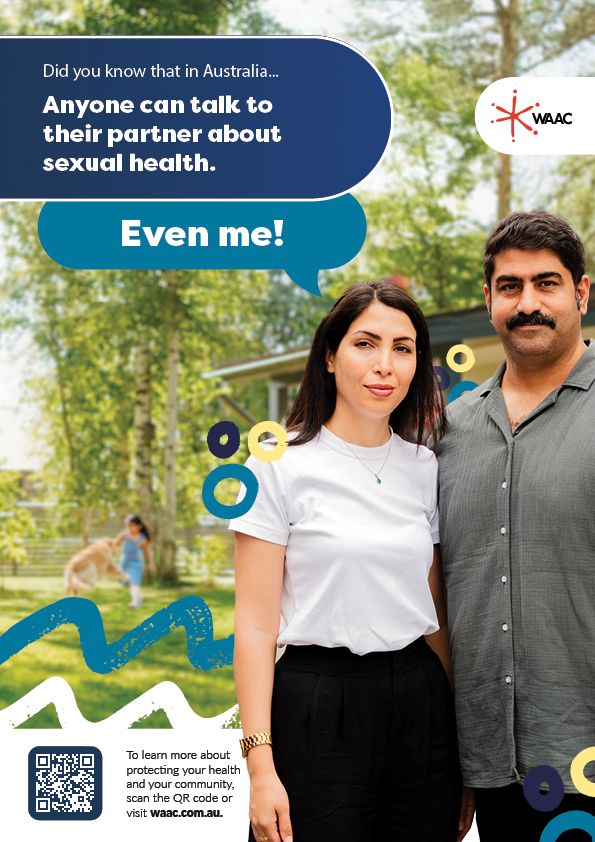 |
📎 Download posters and videos
🎥 Watch campaign videos on YouTube
🩺 Free resources for Health Professionals
📸 Photography by RNF Studios
